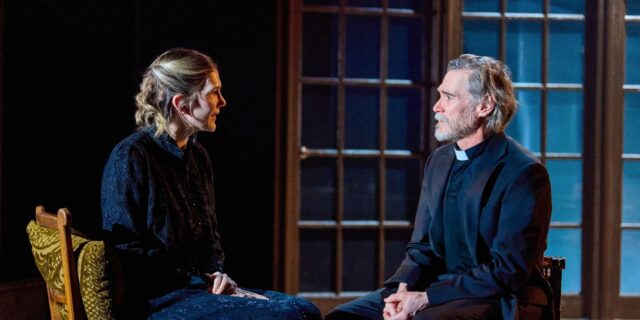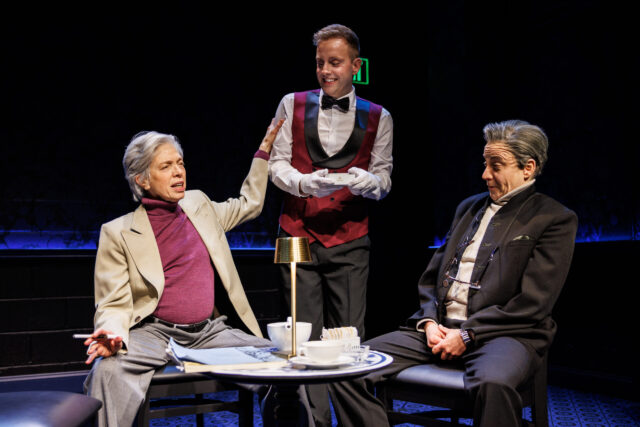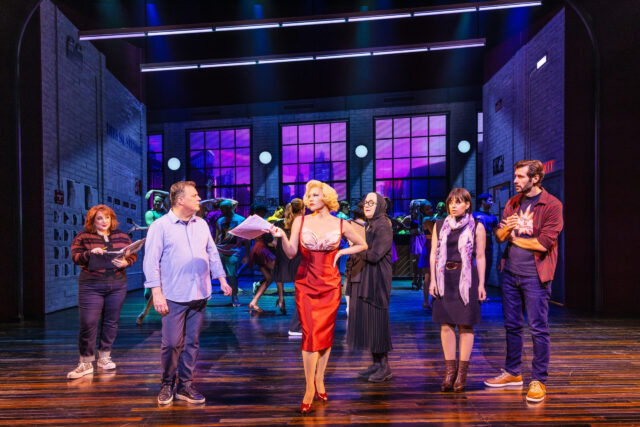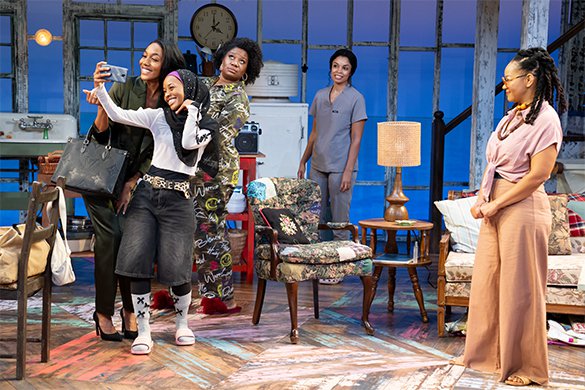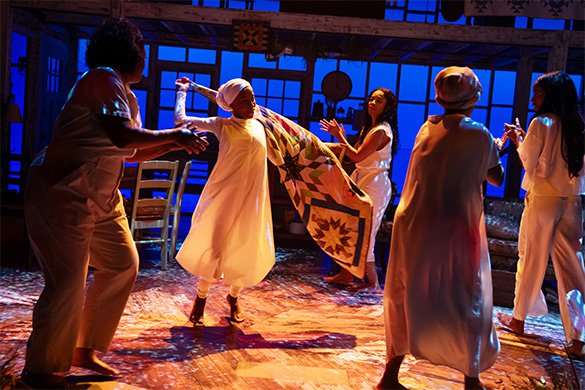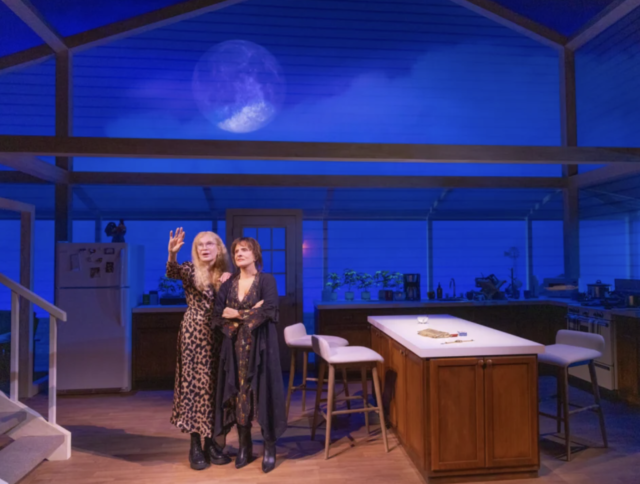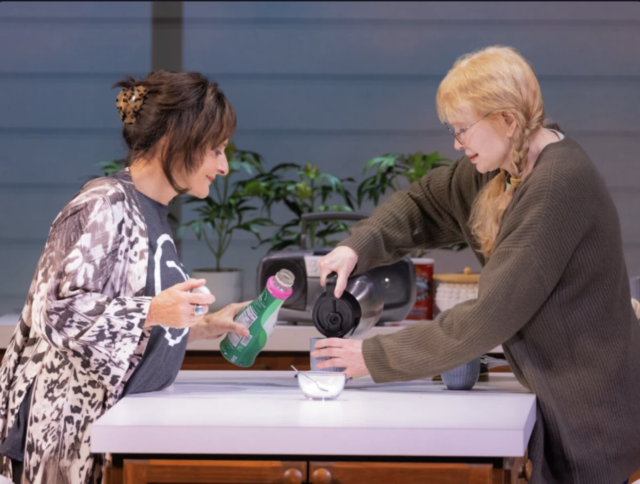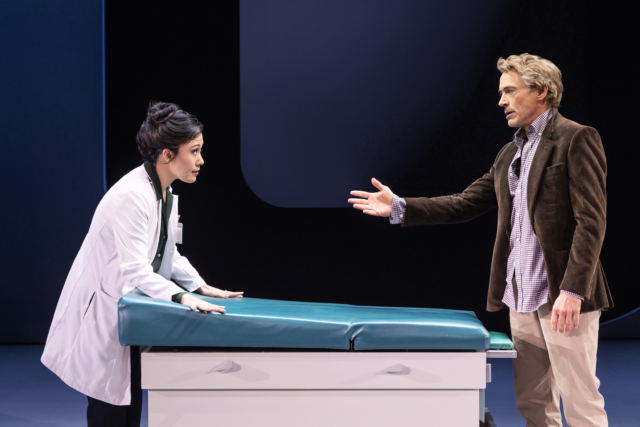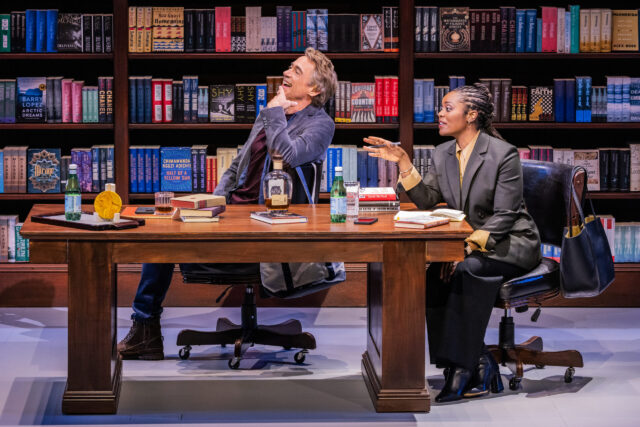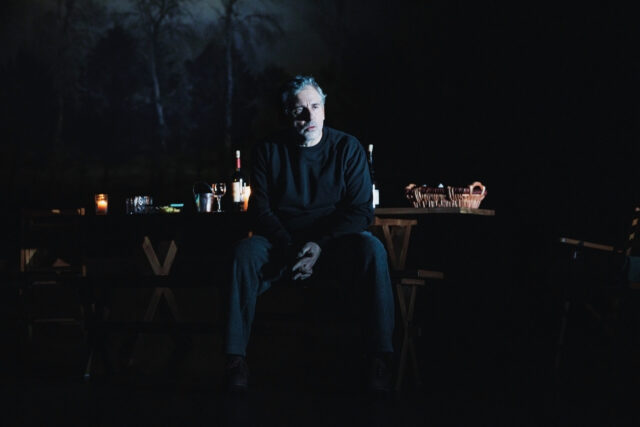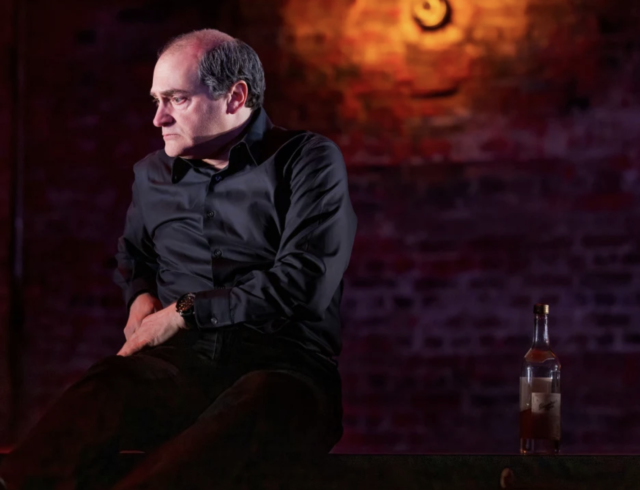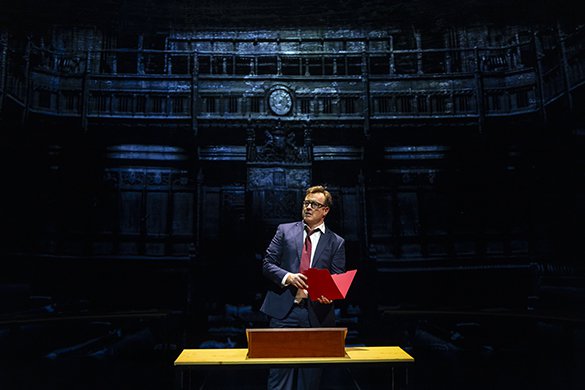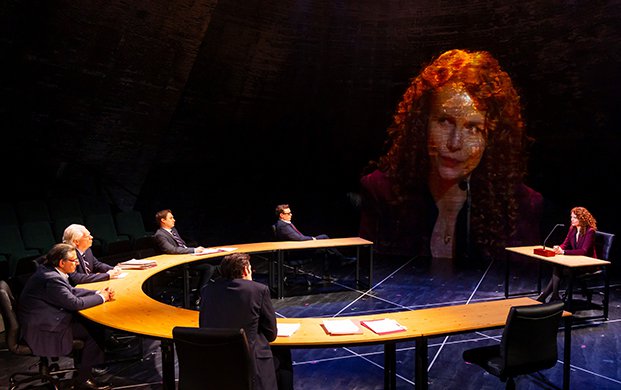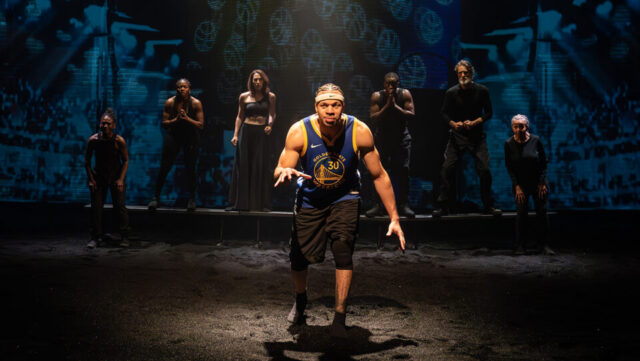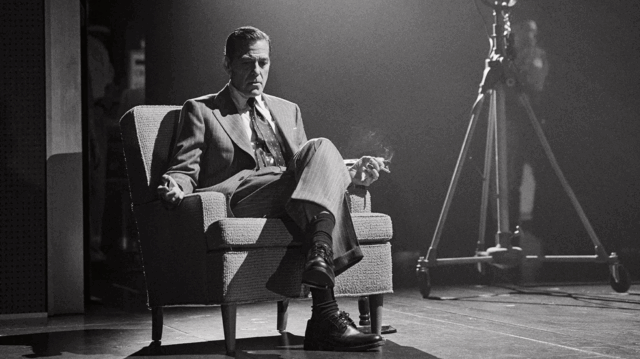
George Clooney stars as Edward R. Murrow in Good Night, and Good Luck at the Winter Garden (photo by Emilio Madrid)
GOOD NIGHT, AND GOOD LUCK
Winter Garden Theatre
1634 Broadway between 50th & 51st Sts.
Tuesday – Sunday through June 8, $329-$849
goodnightgoodluckbroadway.com
In 2005, Good Night, and Good Luck., a film directed by George Clooney and written by Clooney and Grant Heslov, was a big hit, earning six Oscar nominations, for Best Picture, Best Director, Best Original Screenplay, Best Cinematography, Best Production Design, and Best Actor, for David Strathairn’s portrayal of famed newsman Edward R. Murrow, focusing on his battles with Sen. Joseph McCarthy and his reckless search for communist sympathizers in politics and the entertainment industry. Clooney had a supporting role as Fred W. Friendly, coproducer of Murrow’s popular See It Now television program.
Heslov, Clooney, and Tony-winning director David Cromer have now adapted the film into a Broadway play — deleting the period at the end of the title — and for the most part it is an efficient, satisfying show, although it relies too heavily on the film rather than making the most of the opportunities live theater presents.
This time around Clooney takes on the starring role of Murrow, a cigarette-smoking investigative journalist who prefers hard-hitting news stories to celebrity fluff pieces, although he’s told he needs to do the fluff for ratings and to keep the network heads happy; Glenn Fleshler is Friendly, who offers as much support and advice as he possibly can. The narrative is bookended by a speech Murrow gave at the October 1958 Radio-Television News Directors Association Convention in Chicago, where he posits, “This just might do nobody any good. At the end of this discourse, a few people may accuse this reporter of fouling his own comfortable nest, and you all may be accused of giving hospitality to heretical and even dangerous thoughts. It is my desire, if not my duty, to try to speak to you with some candor about what is happening in our mass media. You should know at the outset that I appear here voluntarily, by invitation, and that these remarks are strictly of a do-it-yourself nature.”
The play, about actual events that occurred more than seventy years ago, could not be more relevant today, as the current administration sues television and print media for stories they view as unfavorable and seeks to deport legal and illegal immigrants while eliminating habeas corpus. The production makes its points but can get heavy-handed; what works onscreen does not always work onstage, even one dominated by screens. The projections, by David Bengali, range from archival footage of McCarthy to live video feeds of Murrow’s program. There’s always a lot happening on Scott Pask’s expansive studio set, so, combined with the projections, it is often difficult to know where to look. The musical interludes with Ella (Georgia Heers) singing such jazzy numbers as “When I Fall in Love” and “I’ve Got My Eye on You” help create atmosphere but feel extraneous in a one-hundred-minute show. And the subplots involving anchorman Don Hollenbeck (Clark Gregg) and secret romantic partners Shirley (Ilana Glazer) and Joe (Carter Hudson) get lost.
In his Broadway debut, Clooney is stellar as Murrow, capturing the newsman’s serious demeanor and dedication to his responsibility of telling the truth to the American public. It’s his show, and he commands the stage with grace and elegance. Good Night, and Good Luck has so much to say about then and now that it sometimes overplays its hand, as with an unnecessary political video montage. But it’s solid entertainment and a clarion call for all of us to stand up to bigotry and hatred before it’s too late.
The June 7 performance will be streamed live on CNN for free. In the announcement, Clooney stated, “It doesn’t matter what political bend you are on — when you hear things like, you know, ‘We must not confuse dissent with disloyalty. We must remember always that accusation is not proof and a conviction depends on evidence and due process of law, and we will not walk in fear of one another. We won’t be driven by fear into an age of unreason,’ I think those are extraordinarily powerful words for who we are at our best.”
As the play reveals, we’re going to need a lot more than good luck to get out of the mess we’re in.
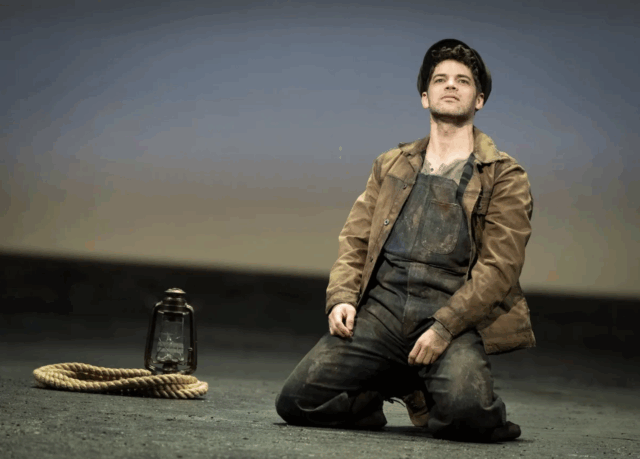
Jeremy Jordan stars as the title character in Floyd Collins at Lincoln Center (photo by Joan Marcus)
FLOYD COLLINS
Vivian Beaumont Theater at Lincoln Center Theater
150 West 65th St. between Broadway & Amsterdam Ave.
Tuesday – Saturday through June 22, $58-$299
www.lct.org
On January 30, 1925, while spelunking to find a cave that could be turned into a tourist attraction, thirty-seven-year-old William Floyd Collins got wedged into a small space, his foot caught under a rock. As members of his family and the community tried to rescue him, Bee Doyle’s farm became a media circus. The tale served as part of the inspiration behind Billy Wilder’s underrated 1951 masterpiece, Ace in the Hole, aka The Big Carnival, starring Kirk Douglas and Jan Sterling.
In February 1996, book writer and director Tina Landau and composer and lyricist Adam Guettel adapted the true story into the musical Floyd Collins, which had a short run at Playwrights Horizons. It is now dazzling audiences at Lincoln Center’s Vivian Beaumont Theater in a thrilling production, again directed by Landau, that has been nominated for six Tonys, including Best Revival of a Musical.
Jeremy Jordan is sensational as Collins, spending most of the show in the front corner of the stage, immobile on a rock shaped like a chaise longue. His brother, Homer (Jason Gotay), and sister, Nellie (Lizzy McAlpine), are desperate to save him, while his father, Lee (Marc Kudisch), is angry that Floyd has gotten into this predicament and his stepmother, Miss Jane (Jessica Molaskey), is concerned but won’t argue with her husband, except when he offers money to Dr. Hazlett (Kevyn Morrow) to go inside the cave. Engineer H. T. Carmichael (Sean Allan Krill) decides that he and his company, Kentucky Rock Asphalt, will handle the rescue, incorporating shafting efforts that Homer believes will be too dangerous and take too long to save his brother, while Lee wants him to stay out of it. Documenting it all is Louisville Courier-Journal reporter Skeets Miller (Taylor Trensch), who becomes deeply involved in the story, even risking his safety by going into the cave to attempt to free Collins himself.
The stage design, by dots, begins as a kind of obstacle course as Floyd makes his way deeper and deeper into the cave, with dark rocklike formations popping up and down as he calls into the void, listening for the echoes to let him know if he’s close to what he’s looking for. The eerie sound is by Dan Moses Schreier, with shadowy lighting by Scott Zielinski and projections by Ruey Horng Sun on a rear screen that change colors as the sun rises and sets. Bruce Coughlin’s bluegrass orchestrations maintain a country feel, save for a few traditional ballads that slow the narrative dramatically, and Anita Yavich’s costumes have an appropriately earthy palette.
Floyd Collins is an exemplary cautionary tale about capitalist greed and a predatory media as well as a tribute to American know-how and dedication, the importance of family, and how freedom can so often be just out of reach. It was a different time, but it still feels real as adults and children continue to get trapped in wells and caves, the world holding its collective breath as rescue is not always possible. It also serves as a potent metaphor for our ability to escape from certain situations we see no way out of, both individually and as a republic.
You can find out more about Collins by visiting the Sand Cave Trail in Kentucky, which leads you to Mammoth Cave National Park, where it all took place.
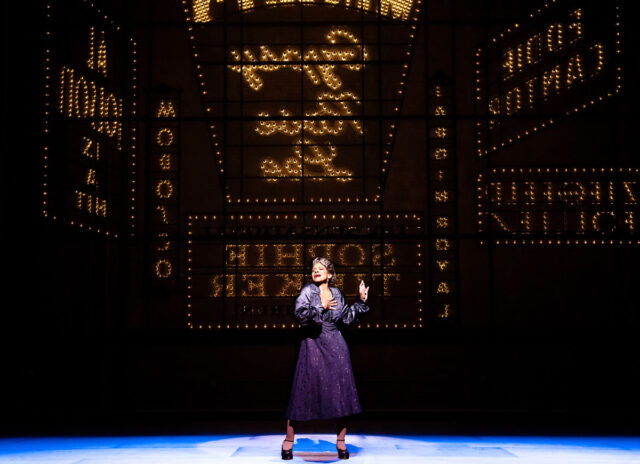
It’s Audra McDonald’s turn at an iconic role, and her performance is unforgettable (photo by Julieta Cervantes)
GYPSY
Majestic Theatre
247 West 44th St. between Broadway & Eighth Aves.
Tuesday – Sunday through October 5, $46-$421
gypsybway.com
Has there ever been more pressure on a performer taking on an iconic musical theater role? In George C. Wolfe’s splendid revival of Gypsy at the Majestic Theatre, six-time Tony winner Audra McDonald is not just following in the lauded footsteps of Ethel Merman, Betty Hutton, Angela Lansbury, Tyne Daly, Linda Lavin, Bernadette Peters, Patti LuPone, Imelda Staunton, Betty Buckley, Tovah Feldshuh, Leslie Uggams, and Beth Leavel in portraying the stage-mother-from-hell — not to mention Rosalind Russell in the 1962 film and Bette Midler in a 1993 TV movie — but her name is essentially part of the title: The marquee and all marketing materials declare: Audra Gypsy. Perhaps not surprisingly, just about everything comes up roses.
Featuring a book by Arthur Laurents, music by Jule Styne, and lyrics by Stephen Sondheim, Gypsy was “suggested” by the 1957 memoir by burlesque legend Gypsy Rose Lee, whose mother, Rose Evangeline Hovick, was obsessed with making her daughters, Rose Louise Hovick and June Havoc, show business superstars. The 1959 Broadway premiere and its numerous revivals have earned a multitude of Tony Awards, and this iteration has been nominated for five, including Best Revival of a Musical and Best Leading Actress for McDonald, the first Black woman to play the part in a major New York production. (Uggams portrayed Mama Rose in 2014 at the Connecticut Repertory Theatre.)
While the three most popular tunes from the show are “May We Entertain You,” “Together, Wherever We Go,” and “Everything’s Coming Up Roses,” the narrative reaches its apex with “Rose’s Turn,” in which Mama Rose grabs center stage and states her raison d’être. “You either got it / or you ain’t. / And boys, I got it! / You like it?” she sings. “Well, someone tell me, when is it my turn? / Don’t I get a dream for myself?” At the end of the song, she repeats over and over again, “For me!,” then takes a series of bows, but it’s not McDonald accepting rapturous applause from the electrified crowd at the Majestic; it’s Mama Rose, basking in the glow of an audience that exists only in her head. The vulnerability of both the performer and the character is almost too much to bear as she reaches out her hands, nods her head, and looks out over an all-encompassing emptiness.
It’s not Mama Rose as monster; it’s every one of us, wondering what could have been, perhaps even what should have been. It’s an unforgettable moment that cements this revival as a unique and celebratory experience.
JUST IN TIME
Circle in the Square Theatre
1633 Broadway at 50th St.
Tuesday – Sunday through December 27, $300 – $916
justintimebroadway.com
www.circlesquaretheatre.com
“I’m Jonathan. I’ll be your Bobby Darin tonight. How about these digs? Not bad for the basement of Wicked,” Jonathan Groff says after the opening medley of “This Could Be the Start of Something Big” and “Just in Time” that kicks off the electrifying biomusical Just in Time at Circle in the Square, underneath the Gershwin, where Wicked has been running for more than twenty years.
Developed and directed by two-time Tony winner and Emmy and Grammy nominee Alex Timbers, Just in Time tells Darin’s life story as if it’s a chronological nightclub act in a flashy, elegant space designed by Derek McLane. The band performs at one end, with a center section of audience members sitting at candlelit tables. Groff is spectacular as a version of himself, not impersonating Darin but embodying his spirit as he belts out such familiar songs as “Beyond the Sea,” “Splish Splash,” “Dream Lover,” and “Mack the Knife.” Andrew Resnick’s arrangements practically explode as the book, by Tony winner Warren Leight and Isaac Oliver, follows Darin, born Walden Robert Cassotto in 1936 in East Harlem, from his childhood, to his earliest songwriting, and through his personal and professional ups and downs in a career that found him going from one of the most popular entertainers on the planet to living alone in the woods, recording folksongs no one wanted to hear.
Darin, who had a weak heart as a result of rheumatic fever as a child, partnered with Don Kirshner (Caesar Samayoa), made records for Ahmet Ertegun (Lance Roberts), fell in love with Connie Francis (Gracie Lawrence), married Sandra Dee (Erika Henningsen), had a son, released more than two dozen albums, appeared in twelve movies (including garnering an Oscar nomination for Captain Newman, M.D.), and never stopped writing and singing right up until his death in 1973 at the age of thirty-seven.
He loved his mother, Polly Walden (Tony winner Michele Pawk), and had a difficult relationship with his sister, Nina Cassotto (Emily Bergl), at least until he found out a shattering truth about them. He hired Nina’s husband, Charlie Maffia (Joe Barbara), to go on the road with him.
While the first act unfurls at a ravishing pace, the show slows down considerably in the second act, when Darin’s troubles mount; there’s not much Leight and Oliver can do, since it’s a true story. But Shannon Lewis’s choreography, Catherine Zuber’s costumes, Justin Townsend’s lighting, and Peter Hylenski’s sound ensures that it all still looks and sounds grand.
The staging is magnificent as Groff and his fantastic trio of sirens (Christine Cornish, Julia Grondin, Valeria Yamin), serving as both backup singers and Greek chorus, roll through Darin’s impressive songbook. “They’re with me everywhere I go — stage left, stage right . . . They’re gonna help me out tonight — and boy, do I need their help — and boy, are they gonna get spat on. And sweated on,” Groff explains. “I’m a wet man, I’m just generally extremely very wet when I do this, and I’m sorry in advance.” He ain’t kidding; folks at the tables might want to cover their drinks when he floats by.
Tony winner and Emmy and Grammy nominee Groff (Merrily We Roll Along, Hamilton) is the heart and soul of the show, and he is utterly mesmerizing every step of the way. It’s a dazzling performance that will take you sailin’ up a lazy river and beyond the sea, splishing and splashing as you hold on to your dream lover and inhale the scent of eighteen yellow roses because Bobby’s back in town.
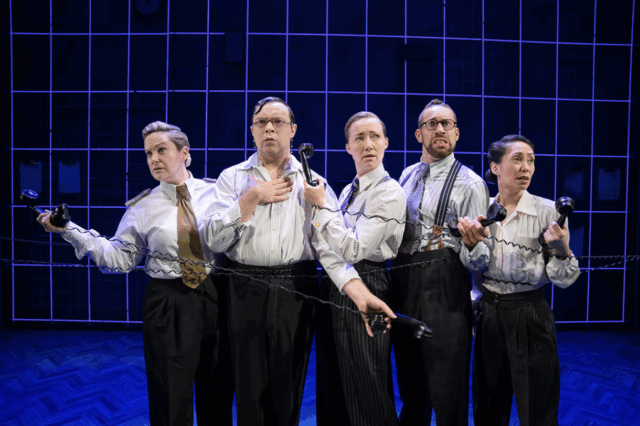
A cast of five tells the remarkable story of a secret Allied WWII mission in Operation Mincemeat (photo by Julieta Cervantes)
OPERATION MINCEMEAT
Golden Theatre
336 West 20th St. between Eighth & Ninth Aves.
Tuesday – Sunday through February 15, $59-$499
operationbroadway.com
The people behind Operation Mincemeat must have given one of the most bizarre pitches in the history of theater: a musical comedy based on a WWII military operation involving a corpse, written and performed by a brand-new madcap troupe of little-known comic thespians known as SpitLip. But it has succeeded magnificently, from its 2019 origins to its two 2024 Oliviers — for Best New Musical and Best Actor in a Supporting Role in a Musical, Jak Malone — and now its 2025 nominations for four Tonys, including Best Musical and Best Performance by an Actor in a Featured Role in a Musical, again for Malone.
It’s 1943, and the Allies are desperate to stop the Axis Powers’ march through Europe. Col. Johnny Bevan tells his MI5 Military Deception team, “Now, as we’re all painfully aware, Hitler’s boys have taken control of mainland Europe, which means the only route back in is through the islands to the South. So the next Allied invasion target is Sicily. And the key to invading Sicily is not invading Sicily. . . . We’re going to convince the Nazis that we’re headed for somewhere else instead. Sardinia, to be exact.”
Intelligence officers Charles Cholmondeley, Ewen Montagu, John Masterman, Reggie Tar, and aspiring spy novelist Ian Fleming submit their ideas to Bevan, who ultimately chooses a plan devised by Cholmondeley and coopted by Montagu with the assistance of clerk Jean Leslie: They handcuff a briefcase to the body of a dead man and have him wash ashore in Spain, with detailed papers revealing that the Allies will be attacking Sardinia, not Sicily.
Joined by MI5 employee Hester Leggatt, the trio of Meryl, Beryl, and Cheryl, pathologist Sir Bernard Spilsbury, submarine captain Bill Jewell, British vice consul Francis Haselden, pilot Willie Watkins, and others, the very strange Operation Mincemeat is underway, but it quickly becomes more complicated than they ever expected.
Boasting such songs as “Born to Lead,” “God That’s Brilliant,” and “Das Übermensch” — along with a glitzy finale titled, well, “A Glitzy Finale” — Operation Mincemeat is like Monty Python on speed, performed by an ultratalented company of only five playing all the roles: The book, music, and lyrics were written by David Cumming (Cholmondeley), Natasha Hodgson (Montagu), and Zoë Roberts (Bevan), and the cast also features Claire-Marie Hall (Leslie) and Malone (Leggatt). Director Robert Hastie somehow manages to have it all make sense amid Ben Stones’s fast-paced set and costume changes.
There have been numerous books written about the military operation, including Ben Macintyre’s 2010 Operation Mincemeat: How a Dead Man and a Bizarre Plan Fooled the Nazis and Assured an Allied Victory, which was first made into a documentary, then adapted into a 2021 film starring Colin Firth, Matthew Macfadyen, Kelly Macdonald, and Jason Isaacs. But none of those prepared anyone for this hilarious musical comedy, which the show references itself.
Hester: And yes it was true, though they’d never believe it.
Jean: They’ll say it’s all true, they’ll never believe it.
Hester: We did all we could do, and if they’d never see it,
Jean: We did what we do, and they’ll never see it.
Hester: We worked and we prayed and it wasn’t in vain.
Jean: And we’ll keep on going.
Hester: We knew pain could be strength and that strength could be pain.
Jean: Even though they’ll never know we . . .
Hester and Jean: . . . forced all their forces to fly!
Believe it or not, Operation Mincemeat flies high.
[Mark Rifkin is a Brooklyn-born, Manhattan-based writer and editor; you can follow him on Substack here.]
